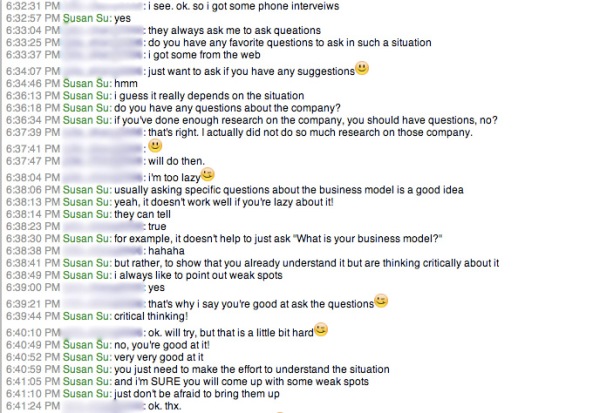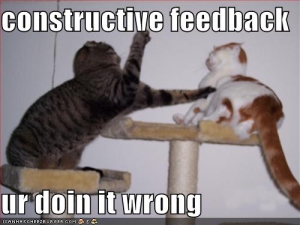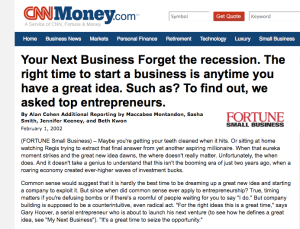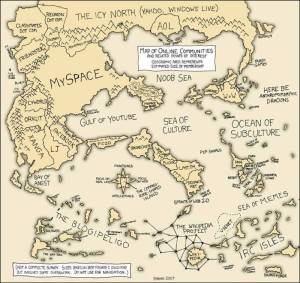| Gen Y | Gen X | Baby Boomers |
|
| How they like to com- municate |
Texting, cell phones and IM | E-mail, IM and cell phones | E-mail, cell phones and face to face |
| Approach to problem solving | Form a team to brainstorm a solution.
Use the web and social networking for research. |
Think up a list of solutions on your own, then call a meeting to discuss. | Think about what’s worked in the past and how it can be replicated, then call a meeting to discuss. |
| What they’re worried about | What they’re worried about | Work/life balance, stability, whether they’re appreciated | Stability and retirement. |
| Respect for them means | Having their ideas valued by co-workers | Having their professionalism and growing knowledge valued | Having decades of work experience and input still valued |
Leading Through Inclusion

Steven Fan, CEO of HelloMovies
A while back, I met Steven Fan, CEO and co-founder of the startup HelloMovies (http://www.hellomovies.com), site that helps you to figure out what to watch, and where to find it.
During our conversation, I was particularly struck by Steven’s personal likeability, openness, and willingness to invite people – even relative strangers like me – into his life.
Steven is a generous, highly intelligent, hardworking Stanford grad and ex-VC associate who’s as friendly and open with car mechanics as with the ambitious and climbing hedge fund crowd. “As long as they’re genuine people,” and “Everyone deserves to be treated nicely,” he says, and really means both.
Steven exemplifies a key trait of entrepreneurs who make a successful transition to leadership (not everyone does), inclusiveness.
Is it surprising that these ‘fuzzy’ character traits have the power to launch a successful leader?
I read lots of entrepreneur and business content that focuses on business tactics, revenue models, and force of personality.
It’s true that there are people who bulldoze their way through projects and conquer followers through force of personality. This is the style so highly leveraged by leaders like Steve Jobs, or Max Levchin – or so I’ve heard.
But, few can rule by fear, and so the bulldozer method probably isn’t going to work for most of us.
Instead, consider this component of the ‘fuzzy,’ high-Emotional-Quotient approach that Steven Fan has mastered: inclusiveness.
ON BEING INCLUSIVE
Several of Steven’s engineers are computer science students at Stanford who don’t own cars. To get to their office that’s in a suburb located a few miles up the highway, Steven personally chauffeurs his developers to work. The engineers are impressed with Steven’s commitment to enabling their work-school balance, and are all the more dedicated to HelloMovies as a result.
As a plus, the shared commute builds the team’s sense of camaraderie and heightens each individual’s feeling of inclusion — all of which have had a positive impact on morale and productivity for the HelloMovies crew.
Steven recalls another moment where inclusion was critical to teambuilding:
To celebrate some milestone we completed for our website, we decided to go bowling. Unfortunately, one of my team members had forgotten his ID and couldn’t get in to the bowling alley because it served drinks. I was not going to leave him outside.
I noticed that people who got in were each given wristbands. I also noticed a back entrance where the bouncer was young, didn’t seem to care much about his job, and had a higher probability of being persuaded. So, a group of us went in first. I took the wristband from one of my friends who got in and went back out to give it to my one ID-less engineer, and we went together to the back entrance. I convinced the backdoor bouncer that my engineer and I were both trying to get back in to the bowling alley after already having our IDs checked the normal way at the front entrance (as evidenced by both of our wristbands, mine pristine and my engineer’s a little recycled-looking). Before the bouncer could really check us, I rushed both of us in and pretended not to hear any other comments from the bouncer.
My team got to enjoy our bowling celebration all together, and we had a great time.

The HelloMovies crew at play with Photoshop.
Being inclusive and open to new people and relationships makes people, in turn, open to you. This helps in life as much as it helps in business. As the two weave more and more closely together, it’s especially critical to building a network that will support you when you’re launching a new product, pitching a potential funder, or even when you just want to throw yourself a birthday party.
Most of us probably think we’re pretty good at including people in our activities and in our lives. Are we really? Here are some questions to ask yourself:
- Do I value the opinion of each member of my team or group? Do I take steps to enable that opinion to surface?
- Is it important to me that the members of my team or group get along and feel happy to be part of the group?
- Do I feel included in my own team or group, like an ‘insider’ rather than an ‘outsider?’
- Am I concerned with others’ sense of belonging to the team or group? Have I thought through steps to better include people in my team or group?
These fuzzy, ‘touchy-feely’ concepts might seem like social basics, but a shocking number of workplace leaders DO NOT GET IT.
How many people have worked in a company where an entire sub-group of employees was systematically excluded from ‘company’ bonding activities that hinged on the way the leaders liked to party, or on the kinds of jokes the leaders liked to tell? This makes the people who are excluded from the In-Club feel crappy, of course, but it’s also a major business oversight that leads to really poor productivity and even worse morale.
Do you want your employees to bail water with you when the boat gets a few holes in its hull? Or how about when the boat’s still being built, as in Steven Fan’s case? Treat them like they are part of your team, your family even. They’ll stay late to finish the project you’ve designed AND do so with humor and satisfaction.
Inclusion counts in these areas:
- Activities. Pick activities that most everyone WANTS to do. If someone can’t, but WANTS to participate, then enable their participation, like Steven did for his engineer who’d left his ID card at home.
- Hours. Should your team members conform to your company’s hours or just get different jobs if it doesn’t suit them? If there’s a forced fit, your team’s talent and morale will most definitely suffer.
- Conversation. If you’re a leader of a team who NEVER talks to the other people on your team, you’re excluding the others and yourself, or creating two (or more) closed circles. This is really bad move because a human leader – one who will drive you to your house when it’s too late to take the Caltrain and you don’t have a car, or one who will help you sneak in to a team party when you’ve left your ID – is a leader that people will trust and follow. Conversation is immensely humanizing.
Becoming more inclusive and more welcoming isn’t a formulaic process. You can, however, ask yourself lots of questions about your own behavior and its associated social perception.
That kind of self-awareness will win you loyalty from the people you rely on most – your team, your company, your friends, your network.
Close An Interview Like You’d Close A Deal
I had this IM conversation with a job-seeking friend last night:

My friend asking me how to close an interview.
To summarize, she wanted to know what she should say to fill the time between when her interviewer asks her “Now, do you have any questions for us?” and when she gets to go home.
There’s nothing I hate more than when people ask me lazy questions that they could find answers to on the Internets. I guarantee you employers hate this too.
You’ve landed an interview, put on your feel-good interview outfit, and listed out all the ways in which you’re a competitive candidate for the job.
At the end of an interview, the interviewer asks you, “Now, do you have any questions for us?”
Like me during interviews in the past, you may be thinking, “Huh? I’m tired, and I just got done telling you how awesome I am. Can’t you just hire me and let me go home to celebrate now?”
If this is what’s going through your head, you’re squandering the biggest opportunity the interview afforded you – the opportunity to close the interview in the same way you’d close a deal.
Closing an interview the way you’d close a deal is about how you communicate with someone who has more social power than you.
When I wrote about how to talk to engineers if you’re in a non-technical function, I was talking about ways to bridge the social power gap through superb communication.
Along the lines of How To Talk To Engineers, closing an interview the way you’d close a deal is achieved in three broad strokes:
1. BRING VALUE
The first step to gaining your potential employer’s respect is to show them that you have value that’s not currently present in their organization.
Use the interview as an opportunity to highlight your expertise. That is, use this precious face-time to present some information that’s useful to their industry positioning that they don’t know, but might like to know.
To do this, you have to objectify yourself. Consider yourself a product with a fixed set of sellable attributes. Which of these attributes will most interest your employer in the next 9 – 12 months?
Exercise: Write, on paper, the answers to the following questions:
• Is the company interested in international expansion? (If so, consider your foreign market experience or the other languages you speak)
• Have you previously worked for a company that has succeeded in a space that your potential employer might be targeting? (If so, consider your experience – even just as an observer – of your previous company’s navigation strategy. Your informant status would be hugely useful to your potential employer)
• What are the gaps in your potential employer’s revenue strategy and what are your unique, unimplemented ideas for how to fill them? (Note: this question is relevant to ALL employers outside of government, including nonprofits, educational institutions, and private enterprises alike)
If you can’t answer these questions, then you need to do more research, which brings us to the next category…
2. DO YOUR HOMEWORK
To her credit, my friend did a bit of homework before pinging me about what to ask an interviewer in return. She searched the Internets for interviewing tips, but found the content to be too general, not the specific, ready-to-ask-verbatim questions she’d been hoping for.
She actually tells me “I didn’t do so much research on the company” and “I’m lazy.”
GRRRR!!! If only my annoyance were the only repercussion.
If you go into a job interview NOT having done 3x the research you initially thought of doing, you will FAIL.
There’s nothing, NOTHING (!!) that interviewers hate more than taking time out of their busy workdays to talk to someone who doesn’t understand the fundamentals – the company’s business model, the organization’s mission, the school’s constituency, etc.
Exercise: To do deep research, look into the following resources:
• LinkedIn AND Facebook searches on EVERY person you will be interviewing with. Ask for the list in advance. Understand their backgrounds and likely points of view. Dig out any network connections you might have with them. (Maybe a college connection? Neighboring social circles? Regional?)
• Company news search starting from their press release page, but definitely not ending there. Extend your news mining to Google News, industry blogs, and Twitter mentions.
• If you’re interviewing at a nonprofit, their operating budget is public information. If you’re interviewing at a startup, you may be able to ascertain their burn rate by asking around or just asking your interviewer. You can use this extremely valuable information to determine everything from burn rate to program size to your likely salary and the organization’s flexibility at the bargaining table.
• Competitor press coverage will show you what else is going on in that niche and help you to define whom your employer might be chasing, or trying to run from.
Deep research will enable you to think critically about the company’s weak spots, which will allow you to…
3. TURN THE TABLES
Here’s the question my friend was getting at. All interviewers will ask you what questions you have for them.
When they ask you this, you’d better have some questions for them, and they’d better be astute, critical, and at least somewhat original.
More than an opportunity for you to ask about the job’s benefits and the company’s chances at success, your questions for your interviewer are the time when you get to grill her as a way to show your critical thinking capacity and your enthusiasm for the job.
If you only ask questions related to you – ‘what do I get out of it’-type questions – you will come off not only as not self-centered and careless, but also as a merely cursory thinker.
After you’ve done your deep research to understand what the company’s weak spots are, the interviewer questioning time is when you should exploit these weak spots to demonstrate your curiosity, thoughtfulness, and general hirability.
And, the moment you’ve been waiting for… six sample questions:
• How will your revenue strategy beat out your competitor’s? Are you aiming to be first in your category, or can you achieve profitability/growth/success in, say, the #3 spot?
• How are you planning to grow your customer/donor/constituent base once you’ve reached saturation among the current group? What if it doesn’t work?
• What company/organization/group outside your industry do you look to as a model for how you want to grow? Why?
• How did you, specifically you the interviewer, get to this position? What was your last company and why did you leave to come here? (Ask this even if you’ve memorized the ‘correct’ answer from your LinkedIn stalking – it’s crucial to hear this in your interviewer’s own words)
• How many employees do you plan to have in 12 months? 18 months? How many customers/markets?
• Why do you think this position is critical to your growth plan?
These are only samples that MUST be tailored to the specific findings you came up with from your deep research. If you don’t tailor them really, really well, you’ll come off sounding like you’re parroting some “how to get hired” blog post…
THE CHALLENGE
If you’re job hunting, run through each of these exercises at least 3 days before your next phone or in-person interview.
If it’s a successful phone interview that ends up converting into an in-person session, run through each of the exercises again 1 day before your in-person interview. Then, at the end of your interview, ask for feedback from your interviewer.
The feedback will be more positive than any you’ve received so far – no matter how qualified or un-qualified you are for the job.
If these strategies work, I would love it if you could please let me know via comments or messages.
FOR RECRUITERS / INTERVIEWERS
What do you have to add? What else do you look for in a standout candidate?
Have any ‘worst interview ever’ memories that you’re able to share with me via private message?
I’d love to get your feedback and stories.
Job Interviews CAN Go Badly
On Friday, I met up with a friend who was recently laid off.
In the nine or ten days that she’d been jobless, she’d applied for a handful of positions and had one interview. Not a bad hit rate, I thought.
Her onsite, however, ended with the interviewer telling her he didn’t think she was fit for the job, due to her lack of specific demonstrated skills related to the job. Ouch! That’s a tough thing to hear in person after several hours of onsite interviewing.
She went home dejected and depressed, and stayed that way for the rest of the week.
What My Friend Should Do Next Time…
Love and learn from her critics.
How it went:
“Based on what you’ve said during this interview, we think you simply don’t have the skill set required to perform this job. Sorry.” <awkward to reject a candidate outright, face-to-face>
“Oh.” <droopy face, slinks away to sulk in dejectedness for the rest of the week>
“Alright, good luck, bye, SEE YA!” <relieved to be done with an uncomfortable interview, frustrated that it took so much company time>
How it should go next time:
“Based on what you’ve said during this interview, we think you simply don’t have the skill set required to perform this job. Sorry.” <awkward to reject a candidate outright, face-to-face>
“Oh ok. Well, if you don’t mind, can you tell me what specific skill set areas you thought should have been stronger? I’d really like to be able to land this type of position in the future and am looking for feedback to improve.” <assertive, honest, yet gentle, questioning of criticism aiming to learn from mistakes>
“Oh well, sure. For this type of position, we’d really like to see more X, and less Y, and specific strengths in category Z.” <pleasantly surprised with this candidate’s direct and proactive approach, and glad to help with constructive feedback>
“Wow, that’s really helpful. I’ll take note of that for next time. Thank you.” <genuinely receptive to feedback, response is rational and data-based, not emotion-based and reactive>
“Alright, good luck, bye. Let’s keep in touch.” <sufficiently impressed with this candidate to think that they may be a good contact for a future position>
Be Entrepreneurial About Criticism
All entrepreneurs know that they’re going to have detractors. The best entrepreneurs welcome dissent. They know that criticism, whether constructive or destructive, helps them to better understand how others perceive them.
When you’re able to get out of your own head and understand how others perceive you – even if those perceptions are misguided – you can figure out how to adjust your personal pitch to speak to the audience you care most about.
Maybe that audience is an interviewer at your dream job. Having lots of previous experience with critique and feedback will help you to succeed in the most important conversations later on.
Learn To Use Rejection
One of my favorite young entrepreneurs, Anjan Sundaram, is a writer and journalist who worked as an AP reporter in the Congo during his first year out of Yale.
How the heck did Anjan land that job as a fresh college grad??
He didn’t. He traveled to the Congo, a jobless 22 year old, on $5,000 in savings from odd jobs during college, and started writing news stories. He sent in one news story every other day to the AP office for the region, and received rejection notices with the same frequency. The ongoing rejection didn’t stop him from mining for feedback, and then incorporating those tips into the way he wrote his next news story.
After 30 days like this, the AP decided to buy one of his stories for $15. At the end of a year, the organization considered him to be one of their foremost experts on the region, had flown him from coast to coast to chase regional news. A few months later, they offered him a full-time job as their youngest expert on the region.
Anjan did two things:
1. Used rejection as an information tool. He didn’t just say “Ok” and walk away back into the bush after his first rejection. He asked “Why?” and then used that information to craft his next, better attempt.
2. Made LOTS of attempts. He didn’t just send in two articles to the AP and call it a year. He produced regularly, upping his chances of success, and used his production stream as a source of constant feedback and improvement.
What To Do If You’re Sensitive
For some people, a constant stream of criticism can be more intense than physical pain.
Here are two practices that can help:
1. Practice at home. My Chinese parents can be really f-ing critical. It made for some angsty, sullen teenage years, but as an adult, I’m better equipped to see criticism as the ultimate learning tool and NOT as a judgment on who I am.
Try practicing asking “Why?” when you hear critical feedback from friends or family, and definitely don’t forget to take that defensive note out of your voice.
2. Give people a piece of your mind. Sometimes the best way to learn to utilize constructive criticism is to dish some out.
The next time your friend (maybe it’ll be me) tries to evangelize some idea that doesn’t make sense to you, share your thoughts and help your friend use rejection as an information tool. Don’t forget to back it up with specific reasons, or you’ll be the one not making sense.
Finally, sometimes people are critical just because they’re pissed off. You can still benefit from the surly folk, however, by realizing that even sucky criticism has something to show you about that situation. If you happen to encounter a pissed off interviewer during a job conversation, it should give you lots of valuable information about that company.
Remember, there’s always a way to spin what’s ‘negative’ into an awareness-building tool to beef up your interview skills, your attempts to start a business, and even your relationships with family and friends.

Tuesday was a sad day at the start-up where I’ve been working for the past nine months.
Though I saw it coming for many weeks, I never anticipated how emotional, and personal, the loss would feel. Most of us non-builders, including product managers like me, were sorrowfully told to pick up our things and say goodbye.
I should have been sadder – most others seemed to be. I was sorry to part ways with my respected coworkers, now beloved friends, but, inside, I was ecstatic.
Am I going to look for another job? Am I going to call back the recruiters who’ve been leaving me voicemails?
I don’t think so.
I’ve worked since I was 14 and have loathed every single job I’ve ever had. Yes, this includes bagging groceries at Larry’s Market, and ringing up cosmetics at The Body Shop in the mall. But, it also includes the job I had playing with toddlers with developmental disabilities at UW, and the job I had on trail crew in the North Cascades. It includes working the weekend weddings at Stanford Memorial Church (ok, that one was kinda cool), and being a research intern to the famous Helen Stacy. It includes manual labor on French farms, and babysitting triplets in San Carlos.
The loathing even includes Google.
In the waning days of my job at the start-up, I finally realized that I am just not cut out to work for anybody BUT MYSELF.
And, lots of twentysomethings I’ve talked to in the past months are telling me the same thing.
“I’m going to do my own thing for a little while.”
“Jack and I are working on a project together.”
“I’ve got some friends at this start-up…”
Aside from the push toward self-discovery, the REALLY good thing about being laid off is that now’s a great time to start your dream project.
A quick Google search for “new companies during recession” turned up this highly relevant CNN Money article:
Funny thing is, the article is from 2002, but is just as relevant now as ever.
Here are the reasons you CAN start businesses during this recession:
1. Leaner, meaner ideas. Recessions make the idea market more competitive, no bubbles, only really good stuff gets through. Things that cost too much to run, or don’t prove themselves to be a profitable, are less likely to be worked on. The ideas that are more likely to be worked on are those with a proven profit model and are easy to scale.
2. Perks (and collar-n-leash loyalty) diminish. When finances go south, your company will probably not be as awesome and supportive to you as you’d always expected. In turn, your loyalty to your company, and your attachment to comfy perks, may wane. This could be just the push you need.
3. Free money! If you get laid off, you’ll get severance and unemployment to last you for a bit while you incubate your business.
4. Free talent! During widespread layoffs, lots of spectacular talent is jobless, and otherwise unoccupied, making it a great time to forge partnerships.
A friend of mine is contemplating grad school in order to adorn her wall, and her resume, with another glowing degree.
Back when I was working my Google dronejob, feeling overqualified, and hating every moment of my forty hours, I thought about grad school too. I figured that an MBA would be my easiest ticket out of my entry-level job and into… something.
I recently had lunch with Bob Ippolito, the CTO and co-founder of Mochi Media, a casual gaming company with a highly successful advertising platform that’s doing a brisk business these days, and I told him the story of my friend (who is obviously a prototype for ALL of my twentysomething friends).
Bob (who’s 27) never graduated from college. A completely self-taught developer, he decided to drop out after one boring year at a state school, to start working and learning from projects he was actually getting PAID to do.

Even though he was wearing his infamous "Pork" shirt when we met up, Bob Ippolito was still pretty much this hot.
Didn’t he ever worry that people wouldn’t respect him because he didn’t have a college degree? What about all those qualifications listed on every single job description?
When I asked him these questions, Bob’s eyebrows raised and his entire body formed into one big casual shrug.
“Why should I be worried? I just figured I wasn’t learning anything more in school that I needed to know for what I wanted to do. I knew I could get a job because people knew my work.”
DAMN STRAIGHT.
Bob is a self-taught developer, having learned code since he was nine years old. By the time he got to college, he already owned, and had read, all the books in the standard college CS curriculum, and already had a reputation as a tech guy who knew how to get it done.
When he decided to leave school and get working, he didn’t use a resume – instead, he showed his work.
Even if you’re NOT a software developer, you CAN create a reputation that precedes you.
You can even do it through social media.
Are you a writer? Where’s your blog?
Are you a small business owner? Where’s your Yelp listing (complete with GENUINE five star reviews)?
Are you a filmmaker? A graphic novelist? A jewelry designer? A cat trainer?
The WORST thing you can do is hide the things you do that you love.
The BEST thing you can do is be like Bob – use your passion-activity to grow a reputation that puts your resume out of business.
For me, one lunch hour’s worth of hobnobbing with MBAs at Crittenden, and I knew that having an expensive degree was NOT going to make me smarter, more independent, or happier with my job or life.
Young people (and old people too!), take note: YOU post-grad school are still going to be YOU – confusion, baggage, talent and all.
NOTES:
- Dave McClure’s blog has a useful post about obsolete-ing your resume with social media – includes tips about blogging, LinkedIn, and other non-traditional ways to showcase your work.
- If you do creative work, there are SO many ways you could be showing it off. A video blog or a YouTube channel (for you filmmakers), a rockin Tumblr site (for you graphic novelists), an Etsy store (holla, jewelry designers!), or a really beefed up Yelp listing (crazy cat lady, that’s your cue).
- Bob was a laid-back, smart cookie who took a risk on an old friend, Jameson, who pitched him the idea of Mochi while he was working as a freelance developer.For all you developers, Bob also showcases his superman coding skills on his blog about software development, from_future_import*
UPDATE:
This great article in Eyeweekly.com discusses how, for many young people, grad school serves as merely a pallative treatment to the Quarterlife Crisis. From the article: “Quarterlife crises are the reason that so many universities have turned lower-level graduate programs into a cash cow.”
Begs the question – What are some cheaper ways to address the emptiness of the Quarterlife Crisis that actually promote resolution (rather than procrastination)?
A Generation Gap For Entrepreneurs?
A recent post by Nick Stamoulis of Marketing Pilgrim has me obsessed with questions about the generation gap.
Normally, I prefer to accord agency to the individual, rather than to cliched group identities like “Baby Boomers,” “Generation X,” or “Generation Y.”
But… as an apparent member of the Gen Y tier, I couldn’t help but COMPLETELY identify with the values on this table from Entrepreneur Magazine:
|
|
Man, do I hate being a cliché.
Given these listed values, does this indicate that Gen Y, the ideas-focused, collaboration-centric, hyper-social generation, is inherently more entrepreneurial than, say, Baby Boomers?
My friend Ramit loves to talk about creative, and very entrepreneurial, ways to earn more money and get satisfaction. My good-intentioned, hardworking 50-something parents panic at the very whisper of “freelance” or at the idea of doing something you love for no pay as a way to start an empire (like this blog, muahahaha!).
Countless of my Gen Y friends run side projects that they hope will be their ticket out of corporate drone-dom. They’re not doing everything perfectly, but they’re definitely hungry.
Unlike my parents, who grew up in Maoist China, I was fortunate enough to have all my needs met, and a fantastically fancy education. That meant that I had lots of extra time, resources, and mindspace to think about… ME. MY ideas, MY dreams, and MY “passions” instead of how I am going to achieve enough financial security to support a family.
Atrocious how self-centric I feel right now. I should be donating my salary to paying off my parents’ house, not funding my own side projects, right?
BUT then, I think, for my peers and for our society, this attitude means a generation of young people who aren’t ever going to be complacent cogs in a wheel.
Nope, we didn’t burn our bras or stand in front of tanks, but we are hell-bent on changing the world in our own way, to fit the wacky, beautiful, and implausible visions taking shape from our dreams.
Entrepreneur Lessons From Outside the Valley: Lesson #2 Know Your (Geographic) Advantage
WHAT: Know your geographic advantage.
Sandbox is an offline social and professional network of “extraordinary achievers under 30.” Sandbox is also a for-profit company currently in the process of filing for incorporation under Swiss law.
How does a company make money from being a “network of extraordinary achievers?”
Here’s Sandbox they stacked up in terms of geographic advantage:
- They’re well-connected to universities and their alumni in Europe, the US, and now Singapore.
- Their alumni friends now work in top firms in a variety of industries around the world.
- They’re young in a nation (Switzerland) that’s aging.
- They’re working in one of Europe’s richest, most thriving economies, home to numerous giant multinational corporations with a wealth of cash.
HOW: Market your advantage.
Like any smart business people, the founders at Sandbox market their advantage.
1. Who ARE you that the people in your community AREN’T? Antoine and Fabian are young, savvy social media people surrounded by big, old, rich companies. To market their in-context advantage, they sell social media consulting and help their parents’ generation get in with the cool crowd.
2. Do you have something that somebody else wants? They’ve built a network of vetted, ambitious young people in a bunch of international cities. To market their in-context advantage, they liaise between companies needing super-smart, tested young ‘ambassadors’ in far-flung cities and young people needing jobs.
3. Build value for your members, not just your customers. They’ve created fistfuls of high-value human connections with a strata of young society all over the rich world. For members looking for international career opportunities, or even just fun, like-minded insta-friends at a travel destination, the network is precious enough to be worth some bucks.
To truly market your advantage, you have to understand what your community is missing. If you’re Swiss, and you know your nation is aging and dominated by a few big name companies rather than by a few thousand hole-in-the-wall startups, don’t be touchy. Embrace this reality as an opportunity for you to swoop in.
If you think there’s nothing missing, then you need to have a conversation with my Chinese mother about your ill-conceived notions of perfection. She’ll set you right with some inspiration!



